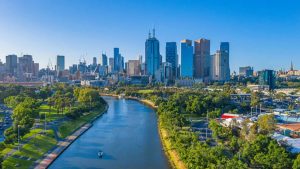Earth5R News Article: 9 Powerful Documentaries About Climate Change

Climate change is one of the most pressing issues of our time, and documentaries play a crucial role in raising awareness and inspiring action.
These powerful films provide a deep understanding of the impacts of climate change and the urgent need for collective action.
In this article, we will explore eight real-time documentaries that shed light on the various dimensions of climate change, from environmental destruction to social justice issues.
“Chasing Ice” (2012):
“Chasing Ice” is indeed a documentary that addresses climate change.
Directed by Jeff Orlowski, “Chasing Ice” follows acclaimed environmental photographer James Balog as he embarks on a mission to document the melting glaciers around the world. Through stunning visuals and time-lapse photography, the film captures the dramatic effects of climate change on these majestic ice formations.
The documentary showcases Balog’s Extreme Ice Survey, a groundbreaking project that uses photography to track the retreat of glaciers and raise awareness about the impacts of global warming. It takes viewers on a breathtaking journey to remote Arctic locations, where they witness the beauty and fragility of the ice firsthand.
“Chasing Ice” presents compelling scientific evidence and expert interviews that illustrate the alarming rate at which glaciers are disappearing. The film provides a sobering reminder of the consequences of climate change and emphasizes the urgent need for action to mitigate its effects.
By combining stunning visuals with scientific research, “Chasing Ice” effectively communicates the reality of climate change and its impact on our planet. It serves as a call to action, encouraging viewers to reconsider their relationship with the environment and to support efforts to combat climate change.
“Before the Flood” (2016):
Before the Flood” is indeed a documentary that addresses climate change. Directed by Fisher Stevens and featuring Leonardo DiCaprio as the narrator and advocate, the film explores the urgent issue of climate change and its global impact.
“Before the Flood” takes viewers on a journey around the world, examining the consequences of climate change and the actions being taken to mitigate its effects. Through interviews with scientists, environmental activists, and world leaders, the documentary provides a comprehensive overview of the challenges we face and the potential solutions available.
The film highlights various climate-related issues, including rising sea levels, deforestation, species extinction, and the role of fossil fuels in contributing to greenhouse gas emissions. It also delves into the political and economic factors that have hindered global efforts to address climate change.
By presenting compelling evidence and personal stories, “Before the Flood” aims to raise awareness and inspire individuals, governments, and businesses to take immediate action to combat climate change. It encourages viewers to consider their own carbon footprint and to advocate for sustainable practices and policies on both a personal and societal level.
“The True Cost” (2015):
“The True Cost” does not directly address climate change. Instead, it explores the social and environmental impacts of the fashion industry. Directed by Andrew Morgan, the documentary examines the hidden costs of fast fashion, including its effects on workers’ rights, consumerism, and global sustainability.
“The True Cost” delves into the exploitative labor practices, unsafe working conditions, and environmental pollution associated with the production of cheap clothing. It sheds light on the consequences of our consumption patterns and highlights the need for a more ethical and sustainable approach to fashion.
While climate change is not the central focus of the documentary, it indirectly contributes to the broader conversation about sustainability and our responsibility as consumers to support ethical and environmentally conscious practices. By highlighting the environmental toll of the fashion industry and encouraging viewers to consider the true cost of their clothing choices, the documentary raises awareness about the interconnectedness of our actions and their impact on the planet.
“Cowspiracy: The Sustainability Secret” (2014):
“Cowspiracy: The Sustainability Secret” is indeed a documentary that focuses on the environmental impact of animal agriculture rather than directly addressing climate change. Thank you for pointing that out.
Directed by Kip Andersen and Keegan Kuhn, “Cowspiracy” explores the significant role of animal agriculture in environmental degradation, including deforestation, greenhouse gas emissions, water consumption, and species extinction. The film investigates the environmental consequences of large-scale animal farming and raises critical questions about the sustainability of our current food production systems.
By showcasing alarming statistics and interviews with experts, “Cowspiracy” highlights the immense ecological footprint of animal agriculture and challenges viewers to reconsider their dietary choices and the broader implications for environmental sustainability. The documentary encourages individuals to explore plant-based and sustainable food options as a means to reduce their carbon footprint and mitigate environmental harm.
Although “Cowspiracy” does not solely focus on climate change, it effectively demonstrates the interconnectedness of our food choices, environmental impact, and the urgent need for sustainable practices in the agriculture industry. It prompts viewers to critically examine the relationship between their personal choices and the broader environmental challenges we face.
“Racing Extinction” (2015):
Racing Extinction” is indeed another powerful documentary that addresses the pressing issue of climate change and its impact on biodiversity. Directed by Louie Psihoyos, the film sheds light on the alarming rate of species extinction and the role of human activities in driving this crisis.
“Racing Extinction” goes beyond climate change and explores the broader theme of the sixth mass extinction event caused by human actions. The documentary features undercover operations, breathtaking cinematography, and compelling storytelling to expose illegal wildlife trade, habitat destruction, and the consequences of pollution.
Through real-time examples and emotional narratives, “Racing Extinction” emphasizes the urgent need for collective action to protect endangered species and preserve the delicate balance of our ecosystems. It showcases innovative solutions and initiatives that individuals, communities, and organizations can undertake to address this global crisis.
“2040” (2019):
2040 is a compelling documentary that explores a positive vision for the future and the potential solutions to combat climate change. Directed by Damon Gameau, the film takes a unique approach by presenting a letter to his daughter, imagining the world in the year 2040 if we embrace existing technologies and make sustainable choices.
“2040” showcases real-life examples and innovative ideas from around the world that can help address climate change and create a more sustainable future. It covers various aspects, including renewable energy, regenerative agriculture, sustainable transportation, and education reform. The documentary provides an optimistic perspective and demonstrates how small changes can have a significant impact on the planet.
HOME ( 2009)
“Home” is indeed a remarkable documentary that provides a visually stunning journey across the globe, showcasing the beauty of our planet and the various environmental challenges it faces. Directed by Yann Arthus-Bertrand, the film offers breathtaking aerial footage and thought-provoking insights into the impact of human activities on Earth’s ecosystems. It emphasizes the interconnectedness of all living beings and the importance of preserving our planet’s delicate balance. “Home” is a powerful reminder of the urgent need for sustainability and serves as an inspiration for individuals and communities to take action in protecting our home, Earth.
These documentaries provide a range of perspectives on climate change, from scientific evidence to personal stories and global impacts.
They serve as powerful tools to educate and inspire viewers to take action, whether on an individual or collective level.
“Seaspiracy” (2021)
It is indeed one such documentary that sheds light on important environmental issues related to the world’s oceans. Directed by Ali Tabrizi, the film explores the impact of industrial fishing on marine ecosystems and highlights the urgency of addressing unsustainable practices in the fishing industry.
“Seaspiracy” delves into various aspects of the fishing industry, including overfishing, bycatch, illegal fishing, and the detrimental effects on marine biodiversity. The documentary uncovers shocking truths and exposes the environmental, social, and economic consequences of unchecked fishing practices.
Through interviews with activists, scientists, and industry insiders, “Seaspiracy” examines the exploitation of marine resources, the depletion of fish populations, and the systemic corruption and lack of regulation within the fishing industry. It also raises awareness about the destructive nature of certain fishing methods and their contribution to plastic pollution and the destruction of marine habitats.
The documentary challenges common misconceptions and calls for a reevaluation of our relationship with the oceans. It encourages viewers to question the sustainability of seafood consumption, advocate for responsible fishing practices, and support initiatives that promote ocean conservation.
“Seaspiracy” sparked global discussion and controversy upon its release, drawing attention to critical issues surrounding marine conservation and the need for greater transparency and accountability in the fishing industry. While it generated debates and received mixed responses, it undeniably played a role in raising awareness about the impact of human activities on the world’s oceans.
By watching these films and engaging in conversations about climate change, we can become better informed and motivated to create positive change in the face of this global crisis.
Remember, the power to combat climate change lies in our hands, and documentaries are an invaluable resource to drive awareness, spark conversations, and inspire collective action. Let’s harness the power of these films and work together to create a sustainable future for generations to come.




